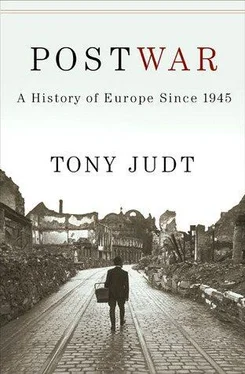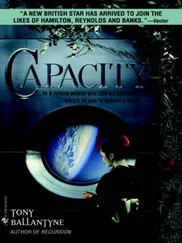On the other hand, television remained a distinctly national and even insular medium. Thus Italian television was unmistakably Italian —from its curiously dated variety shows and stilted interviews to the celebrated good looks of its presenters and the distinctive camera angles deployed when filming scantily clad younger women. In neighbouring Austria an earnest moral seriousness informed locally produced talk shows, contrasting with Germany’s near-monopoly of the rest of the programming. In Switzerland (as in Belgium) each region of the country had its own television channels, employing different languages, reporting different events and operating in sharply contrasting styles.
The BBC, as its critics bitterly observed, had abandoned the aesthetics and ideals of its earlier days as the nation’s moral arbiter and benevolent pedagogue in the drive to compete with its commercial rivals. But in spite of being dumbed-down (or perhaps for that reason) it was even more unmistakably British than ever. Anyone in doubt had only to compare a report, a debate or a performance on the BBC with similar programmes on France’s Antenne 2 , or TF1 : what had changed, on both sides of the water, was far less striking than how much had remained the same. The intellectual or political concerns, the contrasting attitudes to authority and power, were as distinctive and different as they had been half a century before. In an age when most other collective activities and communal organizations were in decline, television was what the mass of the population of every country had in common. And it served very effectively to reinforce national distinctions and a high level of mutual ignorance.
For except during major crises, television channels showed remarkably little interest in events in neighbouring countries—rather less, if anything, than in television’s early years, when fascination with technology and curiosity about the near-abroad led to numerous documentaries and ‘outside broadcasts’ from exotic towns and seascapes. But because Europe was now taken for granted, and—with the exception of its troubled and impoverished south-east—was decidedly un-exotic for most viewers, travel and other programmes on European television had long since ‘globalized’ themselves, turning their attention to farther horizons while leaving the rest of Europe to languish: presumptively familiar territory but in practice largely unknown.
Major public spectacles—imperial-style public funerals in France; royal marriages and deaths in Britain, Belgium, Spain or Norway; reburials, commemorations and presidential apologies in various post-Communist lands—were strictly local affairs, copiously broadcast to a domestic audience but watched only by unrepresentative minorities in other lands. [405]Election results elsewhere in Europe were reported by national mass media only if they had shock value or trans-continental implications. For the most part, Europeans had very little idea what was going on in neighbouring countries. Their singular lack of interest in European elections did not derive just from suspicion or boredom in the face of the elucubrations emanating from Brussels; it was a natural by-product of the largely un-European mental universe of most Europeans.
There was, however, one ubiquitous exception: sport. A satellite television channel—‘Eurosport’—was devoted to broadcasting a wide-range of sports events in various European languages. Every national television station from Estonia to Portugal devoted considerable blocks of airtime to sporting competitions, many of them inter-European and frequently not even involving the local or national team. The appetite for spectator sports had grown dramatically in the last decades of the century even as the number of people attending them in person had mostly fallen, and in three Mediterranean countries there was sufficient demand to support a highly regarded, mass-market daily paper entirely devoted to sport ( L’Equipe in France, Marca in Spain, Gazzetta dello Sport in Italy).
Although many countries still boasted distinctive national sports and sporting events—ice hockey in the Czech Republic, basketball in (curiously) Lithuania and Croatia, the Tour de France and the annual Wimbledon tennis tournament—in continental terms these were minority events, though capable on occasion of attracting millions of spectators (the Tour was the only sporting event whose live spectator turnout had actually increased over the decades). Bull-fighting in Spain held little appeal for young Spaniards, though it had been revived in the Nineties as a sort of revenue-chasing ‘heritage industry’. Even cricket, the iconic summer game of the English, had slipped to a niche position in entertainment terms, in spite of efforts to render it more colourful, more eventful—and to put an end to leisurely but commercially disastrous five-day games. What really united Europe was football.
This had not always been true. The game was played in every European country, but in the initial post-war decades players stayed close to home. Spectators watched domestic league football; the relatively infrequent international games were treated in some places as vicarious, emotionally charged re-runs of military history. No-one who attended football matches in those years between England and Germany, for example, or Germany and the Netherlands (much less Poland and Russia) would have been under any illusion about the Treaty of Rome and ‘ever-closer union’. The relevant historical reference was quite explicitly World War Two.
In the first post-war decades, players from different European countries were quite unfamiliar with one another and had typically never met off the field: when, in 1957, the Welsh forward John Charles made history by leaving Leeds United to join Juventus of Turin for the unheard-of sum of £67,000, it was headline news in both countries. Well into the late 1960s it would have been highly unusual for a club player to find a foreigner on his team, except in Italy where innovative managers were just starting to poach talented outsiders. The glorious Real Madrid team of the 1950s did indeed boast the peerless Hungarian Ferenc Puskás, but Puskás was hardly a representative case. The captain of Hungary’s national team, he had fled Budapest following the Soviet invasion and taken Spanish citizenship. Until then, like every other Hungarian footballer, he was virtually unknown outside his country—to the point that when Puskás led Hungary onto the pitch at London’s Wembley Stadium in November 1953, one of the opposing England players was heard to remark of him: ‘Look at that little fat chap. We’ll murder this lot’. (Hungary went on to win 6-3, the first time England had ever been beaten at home.)
A generation later, Juventus, Leeds, Real Madrid and just about every major European football club had a cosmopolitan roster of players drawn from many different countries. A talented youngster from Slovakia or Norway, once doomed to slog out his career in Košice or Trondheim with occasional appearances on his national team, could now hope to play in the big leagues: gaining visibility, experience and a very good salary in Newcastle, Amsterdam or Barcelona. The manager of the England team in 2005 was from Sweden. Arsenal, the leading British football team at the start of the twenty-first century, was managed by a Frenchman. The north London club’s first-team squad comprised players from France, Germany, Sweden, Denmark, Iceland, Ireland, the Netherlands, Spain, Switzerland, Brazil, Ivory Coast and the USA—as well as a few from England. Football was a game without frontiers, for players, managers and spectators alike. Fashionable clubs like Manchester United parlayed their competitive success into an ‘image’ that could be (and was) marketed with equal success from Lancashire to Latvia.
Читать дальше












